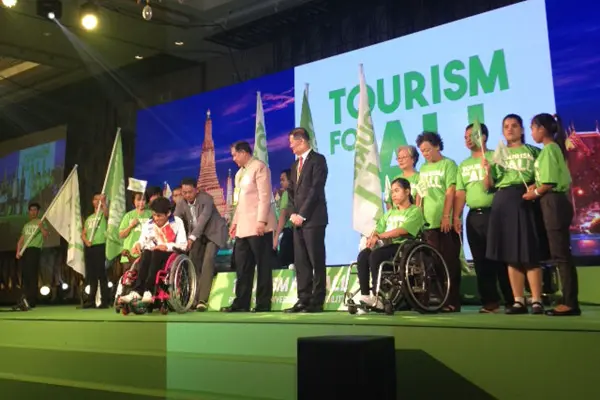Participants of the World Tourism Day 2016, which was held in Thai capital Bangkok Tuesday, called for more accessible tourism for everyone, especially those with disabilities and senior citizens.
The host country Thailand also promised to improve its tourism accessibility soon.
The event this year, under the theme "Tourism for all- Promoting Universal Accessibility," invited representatives from international organizations, governments of several countries and the tourism industry to talk about methods to realize the goal.
Around 1 billion people, or 15 percent of global population have disabilities and thus have difficulties in accessing tourism, according to Xu Jing, executive secretary and regional director for Asia and the Pacific under World Tourism Organization (UNWTO).
"Our theme this year is very important...we want the international community and the tourism industry to take actions, such as improving infrastructure, introducing new legislations,to make tourism accessible for all," Xu told Xinhua.
Everyone is aging, at some point in our lives, sooner or later, we all benefit in universal accessibility in tourism, so it is time to take actions now, Monthien Boontan, United Nations' Committee on the Rights of Persons with Disabilities and member of Thailand's National Legislative Assembly said in a seminar during the event.
Monthien told Xinhua that businessmen in the tourism industry must change their minds as they will find that they can make profits from persons with disabilities, senior citizens, families with small children as well as other customers once the industry is ready.
Chinese tourists visit Wat Phra Kaeo (Emerald Buddha Temple) in Bangkok March 23, 2015. Photo: Reuters.
In a press conference during the event, David Scowsill, president and CEO of World Travel and Tourism Council, emphasized that anyone of any nation, or any sexual orientation should have the freedom to travel around the world freely, thus accessibility needs to be focused.
Attending the celebration of the day, Thai Prime Minister Prayut Chan-o-cha said Thailand is aiming for universally-designed tourism while conserving its historical heritage sites. He said the government will transform Thailand into the "Hub of Universal Design" in ASEAN.
This is good news for Chinese tourists, as Thailand becomes the most populartourist destination in Southeast Asia for Chinese people in recent years.
Against the backdrop of China’s slowing economy, tourism is a bright spot. Many Chinese families are still getting wealthier, and spending that extra income on travel.
Groups of Chinese tourists are already a common sight, from Times Square to Buckingham Palace to Angkor Wat. Last year, Chinese tourists took four billion domestic trips, twice as many as in 2010 and significantly more than the 122 million journeys abroad, according to government statistics.
The government has been encouraging Chinese families to pack up and go. As the economy’s traditional export and investment engines have been slowed by feeble demand and excess factories, policy makers are trying to shift toward services and consumption.
UNWTO celebrates the World Tourism Day annually on Sept. 27 since 1980, so as to foster awareness among the international community of the importance of tourism and its social, cultural, political and economic value, according to UNWTO's official website.
The organization later decided to designate a host country each year to act as its partner in the celebration of World Tourism Day. It is the first time for Thailand to host the event.
(APD)
 简体中文
简体中文

